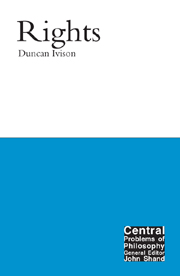6 - Rights, consequences and terrorism
Summary
The war on terrorism is a war for human rights.
(Donald Rumsfeld, 12 June 2002)Introduction
In Chapter 1 I suggested that we look at rights in three ways: as statuses, instruments and conduits. Up until now we have been exploring at least four different ways in which rights can be understood to refer to the fundamental status of persons, whether as the workmanship of God, as possessing some crucial moral faculty, as possessing inherent dignity or as constituted by mutual recognition. In Chapters 6 and 7, we turn to the notion of rights as instruments and conduits. Of course, they can be all three of these things at once, as we shall see, and part of my argument is that a political theory of rights must especially try to capture the sense in which that can be true. But for now I want to treat these ideas separately.
I also argued in Chapter 1 that we should approach rights “naturalistically”. In turning to the idea of rights as instruments and conduits it is hoped that the distinctive nature of this approach will become apparent. If rights are instruments, then they are not primary, but rather derivative of some other valuable moral end or goal. And if they are conduits for the distribution of responsibilities and powers, and yet also for forms of “government” more broadly understood, then they do not only help explain the legitimacy of political power but are implicated in various relations of power themselves.
- Type
- Chapter
- Information
- Rights , pp. 154 - 179Publisher: Acumen PublishingPrint publication year: 2007

